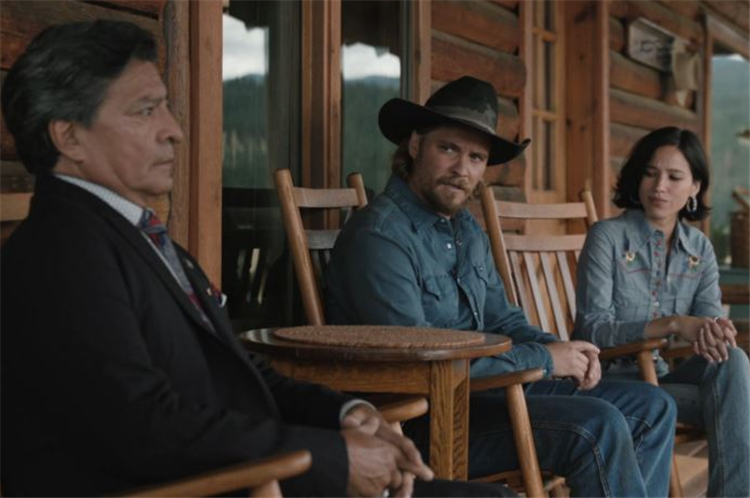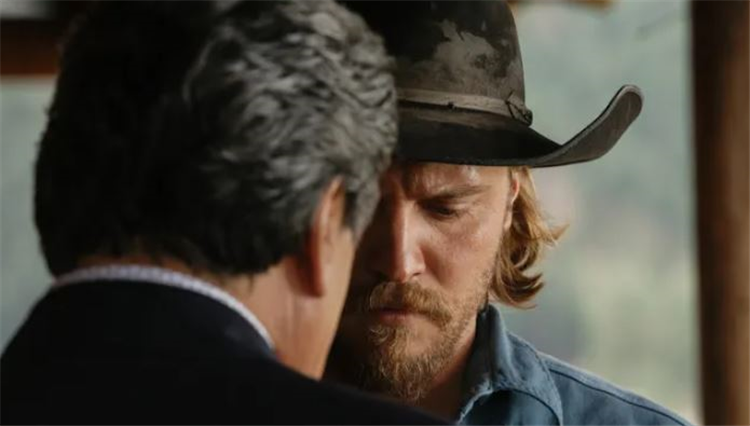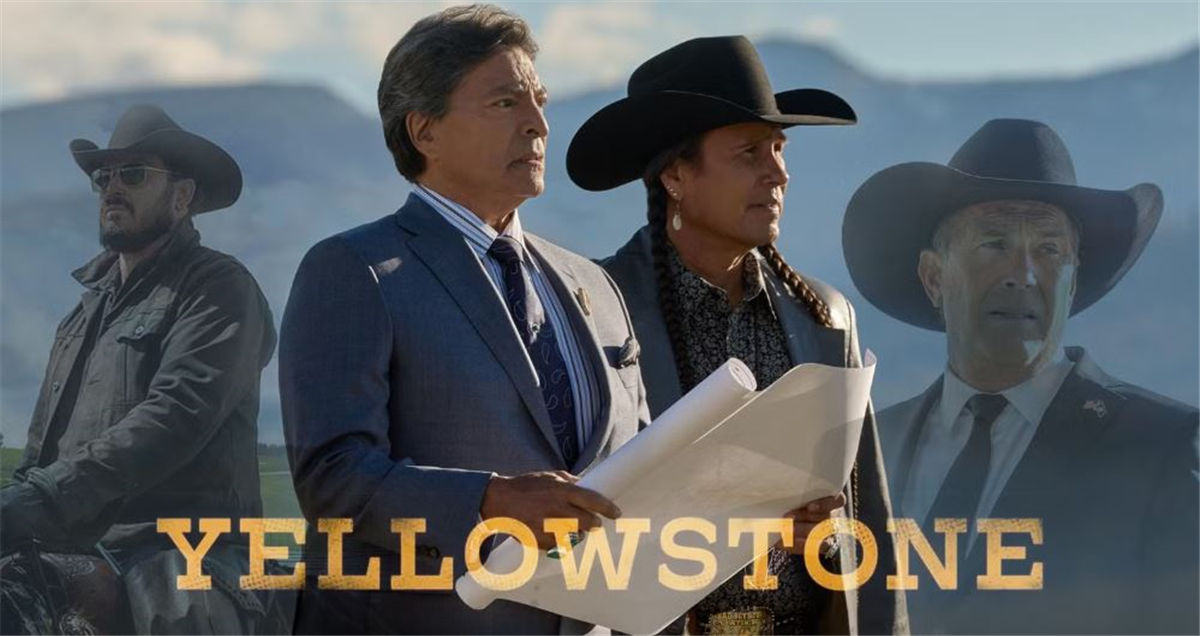Gil Birmingham knew that Thomas Rainwater would get the Yellowstone Dutton ranch since “Episode 1 of the first season,” he reveals to TV Insider. The actor says that Taylor Sheridan has always known that the land would end up back in the hands of the Native American people by the end of Yellowstone, and Birmingham was one of the very few who have known all along. He was “sworn to secrecy” about this storyline for the entirety of Yellowstone‘s filming, he told TV Insider, but knowing the end didn’t make it any less emotionally impactful when it came time to film it.
To save the ranch from capitalist interests, Kayce Dutton (Luke Grimes) sold the family’s land to Thomas Rainwater for $1.25 per acre, totaling $1.1 million according to Beth (Kelly Reilly). That’s a small price for the largest contiguous ranch in the U.S., but the Duttons cared less about money and more about putting the land into the hands of someone who won’t destroy it with condos and airports. The $1.25 per acre price point was how much the land was sold for when it was taken from the indigenous people over a century before.
Giving the land back to the Broken Rock reservation also fulfilled the prophecy from 1883 that stated that in seven generations, the native people would rise up and take back the land from the Duttons. That came to pass 141 years later, but now the Duttons will always have a place on that land because so many of them died to protect it.
Here, Birmingham breaks down what it meant to create this story, sharing other behind-the-scenes details from the final episode and what he thinks happens next.
Season 5 Part 2 scripts were redacted for some cast members. When did you learn that Rainwater was getting the land? Was it as Luke Grimes was saying it while filming?
Gil Birmingham: On Episode 1 of the first season. What I didn’t know was how it was going to happen. I don’t know what season that [Taylor Sheridan] revealed that it was going to happen the way it did, and of course, it was quite different from the way I would’ve imagined. But I think he was following, and he prefaced this in 1883 with the prophecy of Spotted Eagle [Graham Greene], that “in seven generations, my people will rise up and come back for the land.” So it’s almost like there was an agreement, a handshake agreement with John Dutton’s [Kevin Costner] ancestors and the native people back then. So somewhere along midseason [in Season 5], I knew that there was going to be a transfer of land, but I didn’t know how it was going to happen. And I think up until the point that John Dutton left the series, we didn’t. There was probably some adjustments made in that regard as well.
Right. Wow. So you’ve known that would be the ending a lot longer than I had anticipated.
I’m not sure who knew, and of course, I was sworn to secrecy, so I couldn’t tell anybody or any cast members.
You have a profound emotional response on screen when Kayce reveals he’s selling you the land. Do you remember what you were feeling in that moment, shooting that?
Yeah. There were so many different thoughts, and I think primarily was the mission that Tom Rainwater had to try to be of service to his people. He didn’t find out he was even native until he was 18 years old, discovered he was adopted, and just felt compelled to pursue this mission of trying to contribute something to the native community. And that was the project that he did because of his education. So at that moment, I think I was just reflecting on the beauty of something that he would’ve never expected to unfold. It was going to be a battle. It was going to be a mountain to climb for probably his lifetime, whether he was going to be able to accomplish it or not it evolved the way it did. It was just a blessing and a gratefulness and a thanking of God that the mission that he pursued really saw its end in the way that he couldn’t imagine.

Mo Brings Plenty‘s sang in reaction to Kayce’s offer. Was that scripted? What was the song?
That was a song Mo wrote. Taylor wasn’t that familiar with [Native American] songs, but he told Mo that he wanted him to sing a song. And so as far as I know, Mo wrote that song. It was probably a version of his tribe’s song, a song of gratitude and thanks. That was a pretty powerful, powerful moment.
I can’t recall an American TV show that featured a plot where indigenous people get their land back, and especially not as the series finale’s defining moment. What was the emotional impact for you to create this storyline?
Well, I’ve gone through a couple of other Sheridan projects where there was some major emotional components to it. So I understood the poetry by which Taylor often writes, and that’s probably the biggest draw of probably any actor, is first and foremost the script. That’s what it all starts with. So I just felt honored and privileged to be able to play a present-day [indigenous person], an equal power to any of the other characters of agency and intelligence, and to represent a member in the community that exists across the country but very few people ever see that portrayal.
What did you think when you first learned that was going to be the ending?
It brought me to tears just reading it and just feeling the heart in it, and the intent of the character myself as Rainwater. The sense of accomplishment. The blessing, the gratitude. I think there was more gratitude than anything that I have contributed. Well, not even me. At the end when one of my fellow native brothers there said, “You did it.” I said, “I didn’t do anything. God did it.” So the spiritual experience, I think, that this came to us in a way that transcends anything that we were doing as mortal beings battling and conflicting with each other. But it was for the best of all parties involved.
What has fan response been like so far to the series finale?
Well, through the seasons, I think they’ve been very engaged in it. We really want to make entertainment. That’s really our first goal. And then our second goal is, hopefully, if there’s some educational material that we can do, which Taylor tends to do. I don’t know how he knows as much as he does in the worlds that he creates, but he knows quite a bit. But it’s engaging people to be of interest so that they can see the representation as human beings. I think that’s part of our biggest challenge in the native community, is that we’ve so long been portrayed in these very stereotypical and erroneous ways that it just passes its way down generation after generation. The old Cowboy and Indian story still exists, and a lot of projects that don’t have the sensitivity about the distinction are still doing it. So I couldn’t be prouder of, to be part of a show like this that really represents, allows the characters to develop in a real-ife and real-world sense.
Rainwater and the Broken Rock community started dismantling the buildings on the Dutton land after they got it back. Do you think Rainwater would ever move into the main Dutton house?
I don’t think he would move into that house. That’s a culture that’s totally separate than his, and it represented a whole different legacy.
After all the Yellowstone signage was removed from the Dutton property and everyone settled in, how do you think Rainwater spent his first day as the steward of this land?
Well, his intent was to return the land back to the way it was before man ever settled on it, so that would be a law of nature to make it a wilderness area, which it is designated it to be. So it would be, I think, an attempt to determine how you’re going to be able to continue a stewardship of the land and what resources would be necessary for that. But it’s first being protected. It can’t be exploited by commercial endeavors. It can’t be mined. That’s a huge, huge accomplishment. And it provides Thomas Rainwater’s tribe a home where it can’t be changed. I don’t know if you’re aware, but reservations, as they are now, were much larger when they were first structured. And they just slowly, not even that slow, but they just got smaller and smaller and they got overtaken and mostly by corporate interests. So that’s the biggest accomplishment, I think.
And then from that point on, how can we use that land for people? Very much in the same way people go to National parks, people are realizing that that’s one of the rare things that’s going to touch their soul, their remembrance of where we came from and the sustaining qualities of Mother Earth. All things come from Mother Earth, and all living beings are dependent on that, and that’s why it’s important to preserve it. So I think Rainwater might look into maybe educational centers, first of all. I know tribes that have used their resources to provide facilities on their land as hospitals and schools, but a home much in the way that Kayce and Monica [Kelsey Asbille] are going to have a home that nobody else can infringe upon. And they can be secure with that. But I think that might be his next mission.

How else do you think he might spend his day-to-day on the property?
Well, if you even listened to the legacy of the Duttons, there was a lot of sacrifice. It doesn’t come easy. I think there’ll still be other interests trying to exploit the land. It’s kind of a switching roles.
Corporate interest is not going to stop just because the native people have it. They might think it’s even bigger opportunity, so I think that would be actually a lovely spinoff to have in what it’s like for the native culture to try to protect the land and maybe even engage Beth. Beth is going off with Rip in this isolated ranch, and she’s used to a lot of activities. So I think it would be beautiful if she decided she was going to continue the wishes of her father to preserve the land and maybe assist Rainwater with her knowledge.
Do you think Rainwater will still see Kayce, Monica, and Tate [Brecken Merrill] very often now that they’re living on the land’s east camp full-time?
I would hope so. Tate and Monica both want to stay connected to their tribe, and now that they’ve got a different set-up and the land that was once part of one side of his family is now part of the other side of his family, I would think it would be important that they integrate [Tate] in that and that he can learn that side of his ancestry and what responsibilities he may have when he grows up.
With Yellowstone coming to a close, what’s next for you?
Well, Christmas! [Laughs] An actor’s life is this day to day sometimes. It’s one of those spaces where we had this wonderful experience of seven years with these great people and writing a great show. You never know how long a show is going to go and how successful it’ll be, so I think this whole last season was a lot of introspective and sad acceptance of the realization that the show is going to at least change in some form, but this form will end. But I don’t really have anything lined up right now as it is.
Is there any chance we might see you in the Beth and Rip spinoff, or maybe the other Yellowstone spinoff, The Madison?
It’s awesome that fans are so invested in it that they’re just so curious about the Yellowstone universe or the Taylor universe. And he’s obviously got a number of other spinoffs not related to Yellowstone, but yeah, they keep it pretty close to the vest.
Looking back, what are you most proud of with your part in this series?
Definitely the development of a character and a revisionist Western that’s present-day, intelligence, and a man of agency that’s equitable to any other components and characters in the show.
I know most people don’t realize what a battle it is and how difficult it is to find projects that represent us aside from historical context or stereotypical portrayals that are not accurate at all. And then really blessed that I had Mo there as a supportive entity as well, that we could support each other and collaborate with Taylor. He was always open to the collaboration of his storylines, and if we had a suggestion or thought that something should, for example, the knife cutting. That really had to be researched so that it wasn’t some kind of hackney. So I think that’s what I’m most proud of, and I hear that back from the native community, how much they appreciate that it’s a very real portrayal.
Do you have a favorite Rainwater moment?
Oh, I don’t know. Now you’re testing my memory. I think maybe when they cast me [laughs]. The finale was pretty powerful, and it came full circle. I think it was great for people to be able to witness an equitable resolution.
And how does it feel now that the season, and possibly series, has come to an end?
I don’t know. I mean, some people are going on and the show has left itself open to going on to pictures, going on to spinoffs. And it was a “season” finale, not a “series” finale, right? [Laughs]
